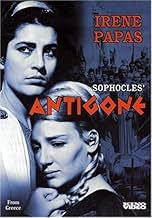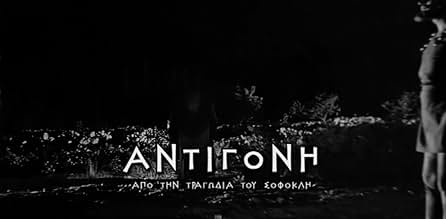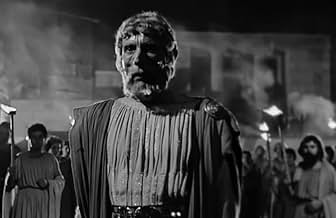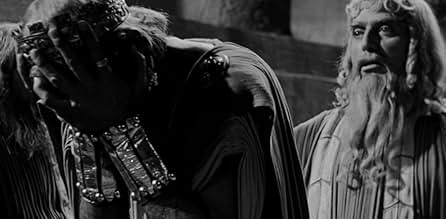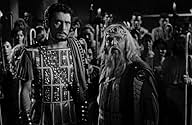Agrega una trama en tu idiomaAntigone defies her uncle's decree that her traitorous brother should go unburied and therefore find no rest in the afterlife; however, her actions have tragic consequences.Antigone defies her uncle's decree that her traitorous brother should go unburied and therefore find no rest in the afterlife; however, her actions have tragic consequences.Antigone defies her uncle's decree that her traitorous brother should go unburied and therefore find no rest in the afterlife; however, her actions have tragic consequences.
- Dirección
- Guionistas
- Elenco
- Premios
- 3 premios ganados y 1 nominación en total
Yorgos Karetas
- Elder of Thebes
- (as Giorgos Karetas)
Mimis Rougeris
- Elder of Thebes
- (as Dimitris Rougeris)
- Dirección
- Guionistas
- Todo el elenco y el equipo
- Producción, taquilla y más en IMDbPro
Opiniones destacadas
Easy to define it as inspired adaptation of Sophocles play. The superb Antigone proposed by Irene Papas, Creod isolated in his convinctions and fears and presumed vulnerabilitz, well performed by Manos Katrakis , Maro Kodou as Ismene or Ilia Lyvikou as Euridyce are the good reasons to see it as exceptional adaptation.
But the basic reason remains the option of Giorgos Tzavellas to suggest a direct interogation to audience.
Gestures in name of justice.
Laws and attitudes.
Radical answers against injustice.
And falls.
Indeed, all known from the Old Greek or Philosophy classes , from lectures of early ages , from other adaptations.
But the strong virtue of Irene Papas to be one with her character , maybe the language itself , maybe the set are details giving to this Antigoni a profound special status . And this makes it real different.
But the basic reason remains the option of Giorgos Tzavellas to suggest a direct interogation to audience.
Gestures in name of justice.
Laws and attitudes.
Radical answers against injustice.
And falls.
Indeed, all known from the Old Greek or Philosophy classes , from lectures of early ages , from other adaptations.
But the strong virtue of Irene Papas to be one with her character , maybe the language itself , maybe the set are details giving to this Antigoni a profound special status . And this makes it real different.
Antigone represents the epitome of philosophical thought in antiquity. The ruler in Creon is set opposite to the loyal sister in Antigone. The ethical dilemma presented in the film is much like Plato's works: Euthyphro and Republic. Creon, as the ruler Thebes, thinks it just to not bury the fallen enemies near the city as it would disgrace the city. Antigone on the other hand feels it just to her fallen brother, a confederate to the previous regime, that he be given a proper burial in regard to his and Antigone's beliefs in the Gods.
The conflict gets its genesis from a varying view of what is just or the right thing to do. Take Plato's dialogue between Socrates and Euthyphro in Euthyphro. Euthyphro explains to Socrates that something pious (just, good) is something unanimously loved by the Gods. Socrates raises the question as to whether the gods love the pious because it is the pious or whether something pious is only pious because it is loved by the gods. The circular dilemma present by Euthyphro brings a question to Antigone. Is she right for wanting her brother buried and disrupting edicts by Creon's rule? Is her pious belief in the Gods something she ought to uphold? Does the good or justice in her brother's burial supersede Creon's rule? Additionally, in Plato's Republic Thraseymachus explains to Socrates that the just is the advantage of the stronger, and that it is just to obey one's rulers. Socrates argues against this conclusion but with weak premises. For Euthyphro, Antigone would be justified in wanting her brother buried in his religious fashion which would dictate his corpse not rotting in the woods. Thraseymachus on the other hand would say that the justice resides in the ruler, Creon, for better or worse. Which is right?
The conflict gets its genesis from a varying view of what is just or the right thing to do. Take Plato's dialogue between Socrates and Euthyphro in Euthyphro. Euthyphro explains to Socrates that something pious (just, good) is something unanimously loved by the Gods. Socrates raises the question as to whether the gods love the pious because it is the pious or whether something pious is only pious because it is loved by the gods. The circular dilemma present by Euthyphro brings a question to Antigone. Is she right for wanting her brother buried and disrupting edicts by Creon's rule? Is her pious belief in the Gods something she ought to uphold? Does the good or justice in her brother's burial supersede Creon's rule? Additionally, in Plato's Republic Thraseymachus explains to Socrates that the just is the advantage of the stronger, and that it is just to obey one's rulers. Socrates argues against this conclusion but with weak premises. For Euthyphro, Antigone would be justified in wanting her brother buried in his religious fashion which would dictate his corpse not rotting in the woods. Thraseymachus on the other hand would say that the justice resides in the ruler, Creon, for better or worse. Which is right?
It is true the more knowledge of the play by Sophocles and of Greek plays, in general, the more you can appreciate this rendition. However, the interesting thing about this presentation is you can start from ground zero and come away with everything the tragedy is about. Even though the story is well known, I will not go through it in case this is your first time.
There is an introduction to bring you up to date from Oedipus through his descendants and history to today where you meet Antigone and her sister Ismene. Their decisions are partially ordained and those of the new king Creon decide the outcome. You may find yourself quoting this play as you would Shakespeare's plays.
The reason for watching it multiple times is the first time around you may be busy reading the subtitles of which some flash and are gone. The second time around you may keep an eye on the acting. Third, you will get used to the Greek and even if you do not speak it, you will find much filled in that was not subtitled. By now you will be hooked and have to watch it periodically.
There is an introduction to bring you up to date from Oedipus through his descendants and history to today where you meet Antigone and her sister Ismene. Their decisions are partially ordained and those of the new king Creon decide the outcome. You may find yourself quoting this play as you would Shakespeare's plays.
The reason for watching it multiple times is the first time around you may be busy reading the subtitles of which some flash and are gone. The second time around you may keep an eye on the acting. Third, you will get used to the Greek and even if you do not speak it, you will find much filled in that was not subtitled. By now you will be hooked and have to watch it periodically.
Antigone, written by Sophocles, is a characteristic Greek tragedy where the city's king, Creon, is faced with a moral dilemma that eventually hastens his fall from grace. Set in antiquity, the movie's plot is designed to question presupposed ideas of justice and wisdom as they were seen through the ancient Greek perspective.
In the movie, the protagonist, Antigone, is faced with a moral dilemma after her king, Creon, orders that her brother should be left unburied (a terrible punishment in ancient Greek culture since it would prevent his passage through the river Styx). Eventually, Despite the king's decree, Antigone decided that her brother's death with-out burial was unjust and challenged Creon's authority to prevent his burial by performing the ritual herself. After the discovery of her crime, Creon sentences Antigone to death – an act that created a great deal of unpopularity in the kingdom and incited lines of questioning very similar to contemporary Socratic arguments.
Creon's decision to sentence Antigone to death and her brother to a hellish afterlife were seen as unjust and despotic by the people of Thebes and caused his wisdom/authority to be questioned. Since ancient Greeks believed that the Sovereign set the morality of their city state, the act of questioning alone represents Socratic argument. Sophocles sets up questioning, in a manner very similar to Socratic arguments made through Euthyphro and Apology, by using Creon's own son and oracle to test Creon's judgment in an attempt to show that just being a king does not make someone wise or knowledgeable of justice.
The morality of Antigone eventually surfaces after Creon's fall from grace. At the end of the movie, Creon finally sees the error of his ways but Sophocles uses his downfall to express how even king's judgment can be governed through hubris instead of actual wisdom.
In the movie, the protagonist, Antigone, is faced with a moral dilemma after her king, Creon, orders that her brother should be left unburied (a terrible punishment in ancient Greek culture since it would prevent his passage through the river Styx). Eventually, Despite the king's decree, Antigone decided that her brother's death with-out burial was unjust and challenged Creon's authority to prevent his burial by performing the ritual herself. After the discovery of her crime, Creon sentences Antigone to death – an act that created a great deal of unpopularity in the kingdom and incited lines of questioning very similar to contemporary Socratic arguments.
Creon's decision to sentence Antigone to death and her brother to a hellish afterlife were seen as unjust and despotic by the people of Thebes and caused his wisdom/authority to be questioned. Since ancient Greeks believed that the Sovereign set the morality of their city state, the act of questioning alone represents Socratic argument. Sophocles sets up questioning, in a manner very similar to Socratic arguments made through Euthyphro and Apology, by using Creon's own son and oracle to test Creon's judgment in an attempt to show that just being a king does not make someone wise or knowledgeable of justice.
The morality of Antigone eventually surfaces after Creon's fall from grace. At the end of the movie, Creon finally sees the error of his ways but Sophocles uses his downfall to express how even king's judgment can be governed through hubris instead of actual wisdom.
Moral claims do not give rise to philosophical grounds. Yet, In Antigone it is clear that moral actions prompt philosophical questions, and inherently make good drama.
This review acts as a strict focus on how moral and ethical points are made throughout the film, and how they act as catalysts to progress the story and keep the viewer involved. Be it known that I have not read the Sopheclean text of Antigone, and fully derive all of my comments and criticisms solely within the boundaries of the film.
The character flaws present in the film mostly derive from wayward and distorted adherences to moral ideologies. For example, Antigone's ethical and moral backbone throughout the film is guided by powerful intangibles like love and loneliness, which makes her rash and at times misguided. Creon's moral code is also in knots as he acts as a Euthyphro in the fact that he is conflicted and contradictory to many of his beliefs that shape him, i.e. his aforementioned moral code.
Values undoubtedly shaped the society of Ancient Greece. Loyalty was a cornerstone value in this society, yet loyalty drifts and fades as tides turn in Antigone. For example, as Creon is crowned King of Thebes he is shown immediate support as the new benevolent King, yet mourning for Oedipus, or any mention of him whatsoever is non existent. Is this a loyal Thebes? Though support of Creon was warranted by his grace, the remembrances of a fallen king laid flat.
As Creon sits on his thrown surrounded by his court he states, "The country's foe is always mine." Little did Creon know that he was the biggest threat to his country, and thus his own foe. Because of the nature of Greek Tragedies and the intuition of most people, the common viewer could understand this at first glimpse. It was clear that Creon's hubris and pride would be his downfall.
Antigone, acting as the protagonist in the film, is the embodiment of good. Yet, contradictions within her moral ideology leads to questioning what "good" actually is. Is her entire moral and ethical embodiment good? Is it her choices of which moral standpoints to act upon that are what is good? Or is it her actions that are good? Simply put, Antigone is a walking paradox. It is impossible to know what is good. Acting against Zeus due to her undying love and care for her brother, or burying her brother because it is just in the Gods' eyes to do so. Both are contradictory and both can be good.
It is clear that both the protagonist and antagonist have inner conflicts. Their inner ideologies contradict. What makes one a "protagonist" and another an "antagonist" lies in the fact that the shared ideologies between them also conflict. Inner contradictions within an individual which conflict with another individuals already clashing ideologies makes it impossible to know who is right and who is wrong. Both characters were acting upon the same ethical grounds. They acted to safeguard human law, religious law, and family values. Is it then that moral grounds are shaped by convenience and circumstance? Does one's moral backbone fit the skeleton of a different distortion of themselves? Is moral rectitude a variable of space and time? Is it the contradictions of moral standpoints that are convenient because they can be malleable to fit any form? These are the questions that I believe the film poses.
The film does a fantastic job at examining exactly what grants a legitimate moral claim or action, which most people are curious about. Reason is man's most precious gift, and by the will of nature, the tone of his reasoning is determined by his moral code.
This review acts as a strict focus on how moral and ethical points are made throughout the film, and how they act as catalysts to progress the story and keep the viewer involved. Be it known that I have not read the Sopheclean text of Antigone, and fully derive all of my comments and criticisms solely within the boundaries of the film.
The character flaws present in the film mostly derive from wayward and distorted adherences to moral ideologies. For example, Antigone's ethical and moral backbone throughout the film is guided by powerful intangibles like love and loneliness, which makes her rash and at times misguided. Creon's moral code is also in knots as he acts as a Euthyphro in the fact that he is conflicted and contradictory to many of his beliefs that shape him, i.e. his aforementioned moral code.
Values undoubtedly shaped the society of Ancient Greece. Loyalty was a cornerstone value in this society, yet loyalty drifts and fades as tides turn in Antigone. For example, as Creon is crowned King of Thebes he is shown immediate support as the new benevolent King, yet mourning for Oedipus, or any mention of him whatsoever is non existent. Is this a loyal Thebes? Though support of Creon was warranted by his grace, the remembrances of a fallen king laid flat.
As Creon sits on his thrown surrounded by his court he states, "The country's foe is always mine." Little did Creon know that he was the biggest threat to his country, and thus his own foe. Because of the nature of Greek Tragedies and the intuition of most people, the common viewer could understand this at first glimpse. It was clear that Creon's hubris and pride would be his downfall.
Antigone, acting as the protagonist in the film, is the embodiment of good. Yet, contradictions within her moral ideology leads to questioning what "good" actually is. Is her entire moral and ethical embodiment good? Is it her choices of which moral standpoints to act upon that are what is good? Or is it her actions that are good? Simply put, Antigone is a walking paradox. It is impossible to know what is good. Acting against Zeus due to her undying love and care for her brother, or burying her brother because it is just in the Gods' eyes to do so. Both are contradictory and both can be good.
It is clear that both the protagonist and antagonist have inner conflicts. Their inner ideologies contradict. What makes one a "protagonist" and another an "antagonist" lies in the fact that the shared ideologies between them also conflict. Inner contradictions within an individual which conflict with another individuals already clashing ideologies makes it impossible to know who is right and who is wrong. Both characters were acting upon the same ethical grounds. They acted to safeguard human law, religious law, and family values. Is it then that moral grounds are shaped by convenience and circumstance? Does one's moral backbone fit the skeleton of a different distortion of themselves? Is moral rectitude a variable of space and time? Is it the contradictions of moral standpoints that are convenient because they can be malleable to fit any form? These are the questions that I believe the film poses.
The film does a fantastic job at examining exactly what grants a legitimate moral claim or action, which most people are curious about. Reason is man's most precious gift, and by the will of nature, the tone of his reasoning is determined by his moral code.
¿Sabías que…?
- TriviaThe movie sold 43,705 tickets. It came in 12th out of 68 movies.
- ConexionesReferenced in Dinos Katsouridis: Mia zoi san sinema (2012)
Selecciones populares
Inicia sesión para calificar y agrega a la lista de videos para obtener recomendaciones personalizadas
- How long is Antigone?Con tecnología de Alexa
Detalles
- Tiempo de ejecución1 hora 33 minutos
- Color
- Mezcla de sonido
- Relación de aspecto
- 1.37 : 1
Contribuir a esta página
Sugiere una edición o agrega el contenido que falta

Principales brechas de datos
By what name was Antigoni (1961) officially released in Canada in English?
Responda

